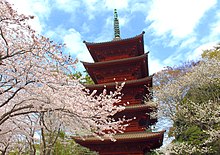|
Hokekyō-ji (Ichikawa)
  Hokekyō-ji (法華経寺) is a temple of the Nichiren-shū[1] founded during the Kamakura period in Ichikawa, Chiba Prefecture, Japan. One of Nichiren's most important writings the Risshō Ankoku Ron,[2] regarded as one of the National Treasures of Japan, is kept at the temple. Next to other documents it is being presented to the public on 3 November each year. Buildings
Restoration of the SoshidōWhen the Soshidō (祖師堂) was dismantled for repairs in 1987, evidence from the fabric and forty-five wooden tablets that were found suggested that the original form had been altered in the rebuilding of 1741. It was understood that originally the building resembled the Honden-Haiden of Kibitsu Jinja and, after an inscription was founded by the master carpenter of 1678 who came from that area, the hall was remodelled on that basis. A wooden shingle roof was installed and the old copper sold off for use by sculptors.[7] See alsoReferences
External links
35°43′15″N 139°56′57″E / 35.72083°N 139.94917°E
|